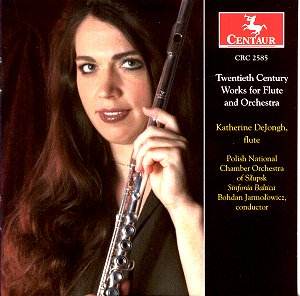One common denominator of this delightful anthology
of works for flute and orchestra is the tunefulness and brevity
of pieces written by composers of different generations, different
countries and different musical horizon, though most of them are
American, past and present. Another common denominator is the
scoring for string orchestra, sometimes with piano or with harp.
However, Frank Martin’s Ballade of 1939 is probably
the best-known work here. Though originally written as a test
piece for the Geneva Conservatory, it has since been eagerly seized
by flautists of all generations. The present version for strings
and piano, made by the composer, is by now quite popular. One
often forgets that Ernest Ansermet made his own orchestral version
which has never really made its mark. I have never heard it but
would like to. This is a typical example of Martin’s maturity
and totally representative of his mature musical thinking. Tightly
argued, often rather austere, it nevertheless abounds in infectious,
often jazz-influenced rhythms and is as rewarding to listen to
as it must be to play, though the solo part is by no means easy.
Bloch’s Suite Modale is a late work composed in
1956 and orchestrated in 1959 a few months before the composer’s
death. This beautiful piece is simple, colourful and direct in
expression. It sometimes brings Vaughan Williams to mind. One
may justly wonder why such delightful music is not heard more
often.
Arthur Foote is the Grand Old Man of the
American composers featured here. His Night Piece
of 1918 is a beautiful Nocturne. Curiously enough, most other
American pieces in this collection are Nocturnes, all of them
beautifully written, attractive and all well worth hearing.
John Corigliano’s Voyage is in
fact an instrumental version of his somewhat earlier a cappella
setting of Baudelaire’s L’Invitation au Voyage written
in 1971. The instrumental version perfectly matches the poet’s
words: There, there is nothing else but grace and measure,
richness, quietness and pleasure. Martin Kennedy’s Souvenir
is a short tone poem in all but the name whereas David Morgan’s
Romance is exactly that. Incidentally, this composer
should not be confused with the British-born composer David Morgan
born in 1933. Katherine Hoover is a composer as well as a professional
flautist (You can hear more of her music on the Parnassus label.
Ed.). Her Nocturne of 1977 is apparently an extended
reworking of an earlier occasional work. It is most idiomatically
written for the instrument, as are all the other pieces.
This very attractive programme ends with the
last movement of Panufnik’s Hommage à Chopin
composed in 1949 for soprano and piano, and orchestrated for flute
and orchestra in 1966.
Katherine DeJongh is a very fine artist, and
she plays beautifully and effortlessly throughout, relishing every
minute of these lovely pieces. Good orchestral playing and quite
decent recorded sound though I find it a bit too close and somewhat
unflattering, but never seriously enough to spoil one’s enjoyment.
Hubert Culot

